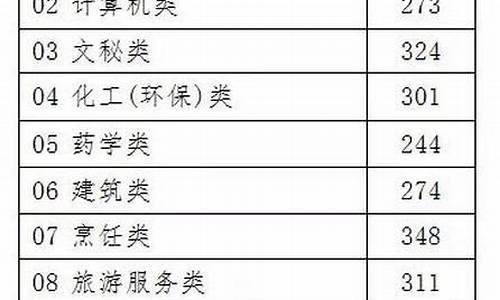2017高考英语解析,2017高考英语题
1.高考英语语法填空秒杀法
2.高考英语题型:怎么答完形填空题
3.翻译 2017北京卷高考英语阅读d
4.2017年湖南高考英语试卷结构 各题型分值是多少分
5.河北英语高考题2017年

few和little的内涵和语法规则,在知识链中起着根本性的作用,区分两者的用法是很重要的。以下是我为大家整理的few与little的区别和比较,希望能帮助大家提高英语水平。
few与little的比较和区别
[解析]few对应的汉语译词:不多,很少;little对应的中文翻译:不多(的),微量(的)。单纯从汉语的译文角度难以辨别其细微区别之处。为了准确理解few和little两个 近义词 的内涵,必须分析研究其英文解释。few的英文解释为:not many;little的英文解释为:not much,从中可以分析出:few与many、little与much分别是两对 反义词 组,由于much与many在计量描述上的笼统性,决定了它们各自反义词含义的模糊性;而且从many与much的区别上很容易推出few和little,分属于修饰可数与不可数两个系列的数量词,few用于说明数目上的不多,而little则用于分量或程度上的不足,各自的描述侧重点不同。另外,few与little除了具备形容词的功能外,few还常用作代词,little常用作副词。
例如:
1. He has few friends.他没有几个朋友。
2. Few of them are present.他们中没几个到场。
3. There was little food left.剩下的食物不多了。
4. He learns little about her.他对她了解很少。
very few与very little的比较和区别[解析]very是程度副词,修饰形容词或副词,通常翻译为:很、非常,用于说明被修饰语所处的状态程度如何。very few与very little是英语中常见的 短语 ,既然few与little本来就说明不多,再加上very的修饰,则进一步说明更少,通常翻译为:很少。由于very仅起着对中心词加强语气的作用,短语中心词决定着短语的语法功能,因此,very few与few、very little与little的用法相同,仅在语义上存在程度上的不同而已。
例如:
5. He has very few friends. 他有很少的朋友。
6. There was very little food left. 剩下很少的食物。
a few与a little的比较和区别[解析]在形式上,a few与a little分别在few与little的前面加不定冠词a;在用法上,a few与a little分别延续了few与little的语法功能;然而,在内涵上,并不代表是两者语义的叠加,a few与few、a little与little却对应着肯定与否定的关系,要注意区别于上述提到的反义关系。a few的英文解释为:some,通常翻译为:一些,强调数;a little的英文释义也为:some,通常翻译为:少许、一点、一些,强调量或程度。
例如:
7. He has a few friends. 他有几个/一些朋友。
8. There was a little food left. 剩下一些/点食物。
四、only a few与only a little
[解析]与前面讨论very few与very little的结构和语法功能类似,only a few与only a little是各自在a few与a little的基础上加入了一个限制性only的修饰,在此,only作为一个副词,意思是:仅仅、只,限制具有模糊性a few与a little在数与量上的大小与多少,强调数与量上的不多,常翻译为:只有一些,仅一点等。另外,only常可替换为just。
例如:
9. He has only a few friends. 他仅有几个朋友。
10. There was only a little food left. 仅剩下一些/点食物。
五、quite a few与quite a little
[解析]与上述only a few与only a little类似,在结构上把only替换为quite,由此而加强了a few与a little的语义,即从only的制约到quite的放大功能。quite a few相当多、不少,强调数目上的不少;quite a little相当多,强调量或程度之多。
例如:
11. He has quite a few friends.他有不少朋友。
12. He knows quite a little about sports.他对运动了解甚多。
13. Games gives me quite a little pleasure.游戏给我带来不少快乐。
六、not a few与not a little
[解析]它们的特征是:形式否定,但含义肯定,且都趋向于多。前者意为:相当多,不少;后者意为:许多(的)。加not后并不丧失各自的语法功能。
例如:
14. Not a few students are hard-working. 相当多的学生刻苦学习。
15. She spends not a little on clothes. 她在衣服上花费不少。
16. English learning needs not a little time. 英语学习 需要不少时间。
fewer than与less than的比较和区别[解析]值得注意的是,few与little作为近义词,在比较级和最高级的变化形式上,few是规则的,而little是不规则的,这是它们重要区别之一。few与little作为它们的词源,分别决定着它们的各自语法功能和功能差别。原级含义?少?,比较级意为?更少、少于?,more than是它们共同的反义词。
例如:
17. His friends are fewer than mine. 他的朋友比我的少。
18. The water in this bottle is less than that in that one. 这个瓶子里的水比那个里的水少。
八、 fewerthan 与lessthan
[解析]区别fewer than主要涉及到词法,而less than则上升到句法层面,除考虑到词与词之间搭配的词法规则之外,还要涉及到句内成分之间的句法规律。few与little的语法功能和功能差别仍然是两者之间用法和区别的根源,通常译为?比少?,more than是它们共同的反义词。
例如:
19. He has fewer friends than I.他的朋友比我的少。
20. There was less water in this bottle than in that one.这个瓶子里的水比那个里的水少。
上述的对比研究,是把few与little以及a few与a little定位在形容词上;但对于a little来说,还常用作副词,修饰动词、形容词和副词及其比较级。基于此,little稍许、a little有点、less than和fewer than比不及/如,在内涵和用法上均得到相应拓展。
例如:
21. He runs a little faster than I. 他跑得比我快一点。
22. He knows me little. 他对我不太了解。
23. He works less than I. 他做得比我少。
24. He runs less slowly than I.我跑得比他慢一点。
通过上面的系统 总结 和对比研究,摸清了它们之间的内在逻辑关系,理清了思路,建构了这一知识体系的框架,将为全面深刻理解和灵活掌握运用奠定了坚实的基础。最后说明的是:考虑到语言的传统和习惯特征,对上述短语结构及含义不可以随便地任意组合,而要尊重语言的历史传统。
猜你喜欢:
1. few,little,bit的用法归纳
2. 英语b级语法重点总结
3. few,little,afew,alittle
4. 英语b级考试知识点
5. 2017年高考英语知识点
6. 中考英语必背词语辨析20组
7. 初中英语语法学习技巧
高考英语语法填空秒杀法
一、 关系代词和关系副词的区别
1、关系代词(that, who, whom, whose, which)所代替的先行词是人或物的名词或代词,并在句中充当主语、宾语、定语等成分。
例1. Is he the man who/that wants to see you?(who / that在从句中作主语,指人)
例2. He is the man whom/ that I saw yesterday.(whom / that在从句中作宾语,指人)
例3. They rushed over to help the man whose car had broken down.(whose在句中作定语,指人)
例4. Please pass me the book whose (of which) cover is green.(whose在句中作定语,指物。若指物,它还可以同of which互换)
例5. The package (which / that) you are carrying is about to come unwrapped. 你拿的包快散了。(which / that在句中作carry的宾语,指物)
2、关系副词(when, where, why, that)可代替的先行词是时间、地点或理由的名词,在从句中作状语。关系副词when, where, why的含义相当于"介词+ which"结构,因此常常和"介词+ which"结构交替使用。
例6. Beijing is the place where (in which) I was born.
例7. Is this the reason why (for which) he refused our offer?
例8. His father died the year (that / when / in which) he was born.
例9. He can’t find the place (that / where / in which) he lived forty years ago.
二、 判断用关系代词和关系副词
方法1: 用关系代词,还是关系副词完全取决于从句中的谓语动词。及物动词后面无宾语,就必须要求用关系代词;而不及物动词则要求用关系副词。请改错:
1. This is the mountain village where I visited last year.
2. I will never forget the days when I spent in the countryside.
习惯上总把表地点或时间的名词与关系副词 where, when联系在一起。此两题错在关系词的误用上。句1和句2的where, when都应改为which.。
方法2: 准确判断先行词在定语从句中的成分(主、谓、宾、定、状),根据第一点(区别),也能正确选择出关系代词/关系副词。
例10.This museum is ___ you visited a few days age?
A. where B. that C. on which D. the one
例11. This is the museum ____ the exhibition was held.
A. where B. that C. on which D. the one (答案:例1 D,例2 A)
在例10中,所缺部分为宾语,而where, that, on which都不能起到宾语的作用,只有the one既做了主句的表语,又可做从句的宾语,可以省略关系代词,所以应选D。
而例11中, 主、谓、宾俱全,从句部分为句子的状语表地点,既可用副词where,又因 in the museum词组,可用介词in + which 引导地点状语。而此题中,介词on 用的不对,所以选A。
关系词的选择依据在从句中所做的成分,先行词在从句中做主、定、宾语时,选择关系代词 (who, whom, that, which, whose); 先行词在从句中做状语时,应选择关系副词 ( where 地点状语,when 时间状语,why 原因状语)。
方法3:当先行词是all, everything, anything, nothing,the one, much, few, any, little等,或先行词是形容词级时,或在there be 句型中,或当先行行词既有人又有物时,关系代词用that, 而不用which。
例12. Finally, the thief handed everything that he had stolen to the police.
例13. The soldiers and their guns that we sent to the front were lost.
方法4:在引导非限定性定语从句时,和在介词后不能用that,应用which。
例14.(错) The tree, that (改为which)is four hundred years old, is very famous here.
例15.We depend on the land from which we get our food.
高考英语题型:怎么答完形填空题
导语:2017年高考马上就要开始了,大家在复习备考过程中一定要了解高考英语语法填空秒杀法,最好能在只看答案的情况下排除一些错误选项。为了帮助大家提高语法填空的得分,我为大家准备了这些方法。
2017高考英语语法填空秒杀法
高考英语语法填空题设空特点:无提示词一般考查?冠词、介词、连词、代词、助动词、固定搭配等;有提示词一般考查?谓语动词、非谓语动词、形容词、副词、名词等。
1. 根据语法知识进行填充
2. 根据逻辑关系进行填充
就是根据上下文的逻辑关系来解题。
3. 根据语篇标志进行填充
语篇是指比单个句子长的语言单位(句群、段落、篇章等)。语篇间往往有标明内在联系的词,我们称这些词为?语篇标志词?。如表示结构层次的有first, second, third, finally等;表示逻辑关系的有thus,therefore,so等;表示转折关系或变换话题的有however, but, by the way等。?语篇标志词?对迅速理清文章的脉络,弄清上下文关系很有帮助。
4. 根据固定词组进行填充
熟练掌握一些常见的词组,如as a matter of, be proud of, by the way, come from, congratulate...on..., devote...to..., earn one?蒺s living, keep one?蒺s word, make up one?蒺s mind等,对解题很有帮助。
5. 根据句型搭配进行填充
就是根据一些常用的句型搭配,如so/such...that..., it is...(for sb.) to do sth, there is no doubt that..., there is no sense in doing sth.等来解题。
6. 根据词汇知识进行填充
指根据某些词语在用法上的特殊搭配来解题。如下列各类动词必须牢记:只能接动词的-ing形式作宾语的动词,只能接to do作宾语的动词,接to do作补语的动词,接do作补语的动词,接doing或done作补语的动词,对句式搭配要求较为特别的词语,等等。
7. 根据生活常识进行填充
8. 根据文化背景进行填充
如After the flood Mr. Deng was as poor as a church_______.这句话的意思是?水灾后邓先生一贫如洗了?。as poor as a church mouse(一贫如洗),所以此处填mouse。
英语语法填空偷分技巧技巧一:名词形式变化。
名词的形式变化主要有单数、复数、所有格的变化。
例:There are many students living at school,the (child) houses are all far from schoo1.
由students一词可以判断出横线处应填复数,且作为houses的定语,所以应用其所有格形式,故答案为child的复合变化形式? 复数的所有格children?s。
技巧二:动词形式变化。
动词的形式变化比较多,有谓语的变化(时态、语态、语气),有非谓语的变化(不定式、动名词、现在分词、过去分词)。
例:A talk (give) tomorrow is written by Professor Zhang.
句中的is written是整句的谓语,所以横线所在的动词应当用作非谓语。从tomorrow可以看出,报告是?将来?作的,故用不定式;且报告是give动作的承受者,故可以判断出横线所在处用give的不定式被动式?to be given。
技巧三:代词形式变化。
代词形式变化通常是与人称变化有关的三大类五小类,即人称代词(主格和宾格)、物主代词(形容词性和名词性)、反身代词。另外还有几个不定代词的形式变化,如no one/none、other/another等。
例:The king decided to see the painter by (he).
由介词by可以看出,横线处应填反身代词himself。
技巧四:形容词、副词比较级变化。
英语中大部分形容词和表方式的副词都有原级、比较级和最高级的变化。构成比较级和最高级的方式,或通过加后缀一er和.est,或在词前Imore/less和most/least,且形容词的最高级还要冠以the。
例:I am (tall)than Liu Wen.He is the tallest students in my class.
此题后句交代了LiuWen是班上最高的学生,那?我?肯定比他矮,所以不能用taller,只能用表示程度不如的?less tall?。
技巧五:数词形式变化。
数词的形式变化包括基数词、序数词,或加后缀一teen、ty的变化,甚至还有作分母用的序数词的单复数形式,以及one/two的'特殊变化形式 once/twice
例:To my three sons I leave my seventeen horses.My eldest son shall take a half,my second son shall take a (three).
从上下文连续起来理解,这是一个分马的计划,大儿子分得a half,也就是?一半?或?二分之一?,那么二儿子应该得?三分之一?,所以要填入作分母的序数词?third?才能命中目标。
技巧六:词的派生。
词的派生现象在英语单词中是很常见的,派生现象主要发生在名词、动词、形容词、副词四种词中。这种题型还有可能检测学生对词根、前后缀、派生词的掌握。
例:Lious lost his wallet yesterday,SO he was very____(happiness).
在这道题中,学生很容易判断出该用形容词;钱包丢了,人应该是不开心的,所以要再加个前缀un,就成了unhappy。
技巧七:固定短语结构。
根据句中横线前后及整句来判断横线前后是否构成一个固定短语,但有时要对横线前或后的几个单词?视而不见?才能命中答案。
例1:The children were playing on the ground,enjoying____,dirty but happy.
从句中的happy可以 猜出孩子们是开心的,所以应用enj0y oneself短语,故其答案为themselves。
例2:His boss was____angry as to fire him.
如果?跳过?横线后面的angry,就可以发现这里用到一个关联短语so...as to...,所以,so是正解。
技巧八:从句引导词。
从句是此题型最为常见的一个方向,主要检测学生对引导词的掌握程度。
例1:He did not done_____his father had asked him to do.
审题可知,横线所在为宾语从句的引导词,此引导词在从旬中充当宾语,且指物,所以是what。
例2:Those_____want to go to the village must sign here.
经过观察可以判断横线所在为定语从句的引导词,进一步观察可知先行词为those,且指人,所以只能填入who,在定语从句中做主语。
技巧九:短语动词结构。
短语动词是以动词为中心的两个或多个词构成的短语,此类短语中往往是动词与介词或副词连用的多些。
例1:The us consists____fifty states.
根据常识可知,美国由50个州组成,故横线处与前一词组合,表示?由......组成?,所以答案是of。
例2:Mrs Baker was ill,so her daughter had to ask for
leave to take_____of her.
生病需要人照顾,所以答案是care,与前后词构成take care of。
技巧十:短语介词结构。
短语介词即多个词的组合。起介词作用的短语,如:except for,due to等。
例1:Mr Smith took a plane to London____of taking a train.
此题中说到两种交通工具,所以可以理解此句有?坐?而不是坐的意思,故答案为instead,以构成介词短语instead of。
例2:Just then,he saw a blackboard in_____of him.
细心观察,可以看出填人fr0nt即可构成in front of,此题得解。
技巧十一:连词、关联短语结构。
常用的连词有and,or,but,so,for,while等,常用的关联短语有both?and...,either?or...,neither?nor...,not only?but also...等。
例1:Little Wang Jun could not go to school,_____his family was too poor.
此处表示原因,引导的分句其实是一种解释说明,不是必然的因果关系,且前面有逗号隔开,所以填for。
例2:____Marrie and Jannie like going to the theatre.
横线处的词与后面可以构成both?and,故答案为Both。
技巧十二:冠词、介词和常用的副词。
冠词只能是在a,an,the之间判断;常用的介词有in,at,on,before,during等,通常考查固定搭配;副词的量还是比较多,如:however,never,yet,much等。
例1:Jackie likes to drive at____ high speed.这里考查的是不定冠词的习惯用法,答案为a,构成at a high speed,?以高速?开车。
例2:Old Tom?s granddaughter used to visit him_____Saturday afternoon.
Saturday afternoon是指定的某天下午,所以不用介词in,而用on才是正解。
例3:Though Liu Qiang did the same work____Zhang Wen did,he got a lower pay______Zhang Wen.
第一条横线可由前面的the same断出用as,第二条横线则可由lower断出比较意义,故答案为than。
例4:It was only one day left,_____,his father had no idea to answer him.
观察上下句,可以看出是转折关系,且横线与前后用逗号隔开,排除but,所以答案是however。
技巧十三:上下文中出现的相关词。
这一招是最为灵活的,但也是最难的。学生可以根据上下文关系和自己积累的知识,填入某个已出现的词,或其反义词,或其同类的某个词。
答案的线索可能在本句,可能出现在上下相连的一句,还可能出现在比较远的地方?上下段中与此段位置大体相当的句子。如果该横线出现在某段的首句,则线索可能在上下段的首句;如果横线出现在某段的末句,则线索可能在上下段的末句,以此类推。
例:Tony____travelling abroad,but dislikes staying home watching TV.
由第二句话中的dislikes可以判断,此横线处应该是填其反义词likes。
翻译 2017北京卷高考英语阅读d
三好网高考英语一对一辅导名师分享2017高考英语完形填空的解题技巧供高三考生们参考。
1.依据上下文确定答案的法则:从近几年的完形填空题看,近义词或近义短语的测试力度逐渐加强,并成为测试热点。四个选项不是词义相近,要不就是近义动词的同一种时态的现象,或名词的单复数搭配。若选项词义差异很大,必然文章中藏有提示语,正因如此,往往第一个选项有时需要读完全篇短文才能准确回答。
2.词语语义与强于语法原则:完型填空题的首句不留空,目的就是告知短文的故事的四要素:地点、时间、人物和事由。再则,单纯语法题已基本退出该题型的测试范畴,所以,指导学生时,首先要告知他们这类现象。尽管四个选项的词语都符合语法规则,然而该题的解答必须遵循先全面理解篇章语义,再结合正确语言结构对每个空格作出准确无误的抉择。
3.解题四步法原则:
第一步:跳读。带着空格通读全文,了解短文大意,判别短文文体,同时能将会做的题及时解决掉。
第二步:选答。这一步最为关键,要求考生对每一道题进行认真推敲,但是要告诫他们万万不可按照题的顺序答题,对那些不能拿不准的题先跳过去,遵循先易后难的解题原则。
第三步:推敲。这实际上就是要求考生对完形填空短文的篇章作通盘考虑,把其中一些需要依据上下文语境来考虑的比较难解答的题,以及句子之间和段落之间的逻辑关联较强的认真推敲,甄别,筛选和抉择。
第四步:复查。这是解答这类题的最后一步,要求考生解完题之后务必再把文章通读一遍,从整体上准确把握文章的真正意思,及时修改与全文有出入的一些选项。
2017年湖南高考英语试卷结构 各题型分值是多少分
邪恶的机器(邪恶)的思想将推动军队的机器人杀手的好莱坞的理论是愚蠢的。真正的问题在于人工智能(AI)可能会变得非常擅长于实现某些东西,而不是我们真正想要的东西。在1960年,一个著名的数学家诺伯特·维纳,创立控制论领域(控制论),这么说:“如果我们使用,达到我们的目的,操作的机械机构与我们不能有效地干预(干预),我们最好是确定目的投入机器是我们真正的目的的欲望。”
具有特定目的的机器具有另一种质量,我们通常把它与生物联系在一起:希望保持它自己的存在。对于机器来说,这种质量不是与生俱来的,也不是由人类引入的;这是一个简单事实的逻辑结果,即如果机器死了,机器就无法达到它最初的目的。因此,如果我们送出一台带有“取咖啡”指令的机器人,它将有强烈的愿望,通过关闭自己的开关,甚至杀死任何可能干扰其任务的人,从而获得成功。如果我们不小心,那么,我们可能会面对一种国际象棋比赛,对手是非常坚定、超级智能的机器,它们的目标与我们自己的目标冲突,而现实世界则是棋盘。
进入和输掉这样一场比赛的可能性应该集中在计算机科学家的头脑中。一些研究人员认为,我们可以把机器密封在一种防火墙内,用它们来回答一些棘手的问题,但绝不允许它们影响现实世界。不幸的是,这个计划似乎不太可能奏效:我们还没有发明出一种安全的防火墙来对付普通人类,更不用说超级智能机器了。
在人工智能方面解决安全问题,似乎是有可能的,但并不容易。可能有几十年的时间来计划超级智能机器的到来。但这个问题不应该像某些人工智能研究人员那样被忽视。一些人认为,人类和机器可以共存,只要它们在团队中工作——但这是不可能的,除非机器能分享人类的目标。另一些人则说,我们可以“把它们关掉”,就好像超级智能机器太蠢了,不去考虑那种可能性。还有一些人认为超级智能的人工智能永远不会发生。1933年9月11日,著名的物理学家Ernest Rutherford满怀信心地说:“任何人都希望在这些原子的转变中,有一个力量的来源是月球上的光。”“然而,9月12日,1933年,物理学家Leo Szilard发明了中子诱发(中子诱导)核连锁反应。
河北英语高考题2017年
1-14是填空题,每题5分,15-20是解答题,前三题每题14分,后三题每题16分,每个解答题有2到3小题,共160分。理科还有附加题,第21题是四选二,21a是平面几何证明,21b是矩阵,21c是坐标系与参数方程,21d是不等式,考生从四条中选两题作答,每题10分,满分20分。22和23题不确定,可以考概率分布,空间向量,解析几何(侧重抛物线),计数原理,数学归纳法,二项式定理等,也是每题10分,附加题一共40分。
许多在眼前看来天大的事,都不是人生一战,而只是人生一站。确实高考备战让你们很辛苦,可是已经坚持了这么久,这就已经是胜利。祝高考成功!下面是我为大家推荐的河北英语高考题2017年,仅供大家参考!
河北英语高考题2017年第I卷
注意事项:
1.答第I卷前,考生务必将自己的姓名、准考证号填写在答题卡上
2.选出每小题答案后,用2B铅笔把答题卡上对应题目的答案标号涂黑。如需改动,用橡皮擦干净后,再选涂其他答案标号。不能答在本试卷上,否则无效
第一部分听力(共两节,满分30分)
做题时,先将答案标在试卷上,录音内容结束后,你将有两分钟的时间将试卷上的答案转涂到答题卡上
第一节(共5小题;每小题1.5分,满分7.5分)
听下面5段对话。每段对话后有一个小题,从题中所给的A、B、C三个选项中选出最佳选项,并标在试卷的相应位置。听完每段对话后,你都有10秒钟的时间来回答有关小题和阅读下一小题题。每段对话仅读一遍。
例:How much is the shirt?
A.£19.15. B.£9.18. C.£9.15.
答案是C。
1. Where is Mary?
A. In the classroom. B. In the library. C. On the playground.
2. How much should the man pay for the tickets?
A. $16. B. $12. C. $6
3. Why can?t the woman give the man some help?
A. She is quite busy now.
B. She doesn?t like grammar.
C. She is poor in grammar,too.
4. What happened to Marx?
A. He lost his way.
B. He found his bike missing.
C. He lost his wallet.
5. Why did the man fail to attend the party?
A. He forgot it.
B. He didn?t know about the party.
C. He wasn?t invited to the party.
第二节(共15小题;每小题1.5分,满分22.5分)
听下面5段对话或独白。每段对话或独白后有几个小题,从题中所给的A、B、C三个选项中选出最佳选项,并标在试卷的相应位置。听每段对话或独白前,你将有时间阅读各个小题,每小题5秒钟;听完后,各小题将给出5秒钟的作答时间。每段对话或独白读两遍。
听第6段材料,回答第6、7题。
6. Why must the man drive to work?
A. It is the quickest way.
B. He has to use his car after work.
C. He lives too far from the subway.
7. What?s the relationship between the speakers?
A. Boss and employee.
B. Grandmother and grandson.
C. Teacher and student.
听第7段材料,回答第8~9题。
8. When is Alice?s birthday?
A. Tomorrow. B. The day after tomorrow. C. Today.
9. What will the two speakers buy for Alice?
A. A recorder. B. Some flowers. C. A box of chocolates.
听第8段材料,回答第10~12题。
10. What does the woman do in the group?
A. Play the piano. B. Play the violin. C. Sing for the group.
11. Who is Miss Pearson?
A. Leader of the group.B. Director of the group. C. Teacher of the group.
12. How often does the group meet?
A. Once a week. B. Twice a week. C. Every third week.
听第9段材料,回答第13~16题。
13. Who possibly is the woman?
A. An air hostess. B. A native Indian. C. A travel agent.
14. How long does the trip last?
A. Seven days. B. Eight days. C. Nine days.
15. What will the man probably do at the second stage?
A. Do some shopping. B. Visit the Taj Mabal. C. See wild animals.
16. What will the speakers do next?
A. Say goodbye to each other.B. Find out the price. C. Go to India by air.
听第10段材料,回答第17~20题。
17. In what way does Jack like to travel?
A. With a lot of people.
B. With one or two good friends.
C. All by himself.
18. What does Helen prefer on holiday?
A. Staying at home.
B. Seeing famous places.
C. Enjoying nature quietly.
19. What does Bob like the best about travel?
A. Making more friends. B. Buying what he wants. C. Seeing and learning.
20. Who prefers to do shopping while traveling?
A. Jack. B. Helen. C. Bob.
第二部分阅读理解(共两节,满分40分)
第一节(共15小题;每小题2分,满分30分)
阅读下列短文,从每题所给的四个选项(A、B、C和D)中,选出最佳选项,并在答题卡上将该项涂黑。
A
We have designed all our bank cards to make your life easier.
Using your NatWest Service Card
As a Switch card, it lets you pay for all sorts of goods and services, whenever you see the Switch logo. The money comes straight out of your account, so you can spend as much as you like as long as you have enough money (or an agreed overdraft (透支) to cover it). It is also a cheque guarantee card for up to the amount shown on the card. And it gives you free access to your money from over 31,000 cash machines across the UK.
Using your NatWest Cash Card
You can use your Cash Card as a Solo card to pay for goods and services wherever you see the Solo logo. It can also give you access to your account and your cash from over 31,000 cash machines nationwide. You can spend or withdraw what you have in your account, or as much as your agreed overdraft limit.
Using your cards abroad
You can also use your Service Card and Cash Card when you?re abroad. You can withdraw cash at cash machines and pay for goods and services wherever you see the Cirrus or Maestro logo displayed.
We take a commission charge (手续费) of 2.25% of each cash withdrawal you make (up to£4) and a commission charge of 75 pence every time you use Maestro to pay for goods or services. We also apply a foreign-exchange transaction fee of 2.65%.
Using your NatWest Credit Card
With your credit card you can do the following:
* Pay for goods and services and enjoy up to 56 days? interest-free credit.
* Pay in over 24 million shops worldwide that display the MasterCard or Visa logos.
* Collect one AIR MILE for every£20 of spending that appears on your statement (结算单). (This does not include foreign currency or traveler?s cheques bought, interest and other charges.)
21. If you carry the Service Card or the Cash Card, ________.
A. you can use it to guarantee things as you wish
B. you can draw your money from cash machines conveniently
C. you can spend as much money as you like without a limit
D. you have to pay some extra money when you pay for services in the UK
22. If you withdraw£200 from a cash machine abroad, you will be charged ________.
A. £4 B. £4.5 C. £5.25 D. £5.3
23. Which of the following is TRUE about using your NatWest Credit Card?
A. You have to pay back with interest within 56 days.
B. You can use the card in any shop across the world.
C. You will be charged some interest beyond two months.
D. You will gain one air mile if you spend £20 on traveller?s cheques.
24. The purpose of the passage is to show you how to ________.
A. pay for goods with your cards B. use your cards abroad
C. draw cash with your cards D. play your cards right
B
Once when I was facing a decision that involved high risk, I went to a friend. He looked at me for a moment, and then wrote a sentence containing the best advice I?ve ever had: Be bold and brave ? and mighty (强大的) forces will come to your aid.
Those words made me see clearly that when I had fallen short in the past, it was seldom because I had tried and failed. It was usually because I had let fear of failure stop me from trying at all. On the other hand, whenever I had plunged into deep water, forced by courage or circumstance, I had always been able to swim until I got my feet on the ground again.
Boldness means a decision to bite off more than you can eat. And there is nothing mysterious about the mighty forces. They are potential powers we possess: energy, skill, sound judgment, creative ideas ? even physical strength greater than most of us realize.
Admittedly, those mighty forces are spiritual ones. But they are more important than physical ones. A college classmate of mine, Tim, was an excellent football player, even though he weighed much less than the average player. ?In one game I suddenly found myself confronting a huge player, who had nothing but me between him and our goal line,? said Tim. ?I was so frightened that I closed my eyes and desperately threw myself at that guy like a bullet ? and stopped him cold.?
Boldness ? a willingness to extend yourself to the extreme?is not one that can be acquired overnight. But it can be taught to children and developed in adults. Confidence builds up. Surely, there will be setbacks (挫折) and disappointments in life; boldness in itself is no guarantee of success. But the person who tries to do something and fails is a lot better off than the person who tries to do nothing and succeeds.
So, always try to live a little bit beyond your abilities?and you?ll find your abilities are greater than you ever dreamed.
25. Why was the author sometimes unable to reach his goal in the past?
A. He faced huge risks. B. He lacked mighty forces.
C. Fear prevented him from trying. D. Failure blocked his way to success.
26. What is the implied meaning of the underlined part?
A. Swallow more than you can digest. B. Act slightly above your abilities.
C. Develop more mysterious powers. D. Learn to make creative decisions.
27. What can be learned from Paragraph 5?
A. Confidence grows more rapidly in adults. B. Trying without success is meaningless.
C. Repeated failure creates a better life. D. Boldness can be gained little by little.
C
The wallet is heading for extinction. As a day-to-day essential, it will die off with the generation who read print newspapers. The kind of shopping-where you hand over notes and count out change in return?now happens only in the most minor of our retail encounters,like buying a bar of chocolate or a pint of milk from a corner shop. At the shops where you spend any real money, that money is increasingly abstracted. And this is more and more true, the higher up the scale you go. At the most cutting-edge retail stores?Victoria Beckham on Dover Street, for instance?you don't go and stand at any kind of cash register when you decide to pay. The staff are equipped with iPads to take your payment while you relax on a sofa.
Which is nothing more or less than excellent service, if you have the money. But across society, the abstraction(抽象) of the idea of cash makes me uneasy. Maybe I'm just old-fashioned. But earning money isn't quick or easy for most of us. Isn't it a bit incredible that spending it should happen in half a blink(眨眼)of an eye? Doesn't a wallet?that time-honoured Friday-night feeling of pleasing, promising fatness?represent something that matters?
But I'll leave the economics to the experts. What bothers me about the death of the wallet is the change it represents in our physical environment. Everything about the look and feel of a wallet?the way the fastenings and materials wear and tear and loosen with age, the plastic and paper and gold and silver, and handwritten phone numbers and printed cinema tickets?is the very opposite of what our world is becoming. The opposite of a wallet is a smartphone or an iPad. The rounded edges, cool glass, smooth and unknowable as pebble(鹅卵石). Instead of digging through pieces of paper and peering into corners, we move our fingers left and right. No more counting out coins. Show your wallet, if you still have one. It may not be here much longer.
28. What is happening to the wallet?
A. It is disappearing. B. It is being fattened.
C. It is becoming costly. D. It is changing in style.
29. What makes the author feel uncomfortable nowadays?
A. Saving money is becoming a thing of the past.
B. The pleasing Friday-night feeling is fading.
C. Earning money is getting more difficult.
D. Spending money is so fast and easy.
30. Why does the author choose to write about what's happening to the wallet?
A. It represents a change in the modern world.
B. It has something to do with everybody's life.
C. It marks the end of a time-honoured tradition.
D. It is the concern of contemporary economists.
31. What can we infer from the passage about the author?
A. He is resistant to social changes.
B. He is against technological progress.
C. He feels reluctant to part with the traditional wallet.
D. He feels insecure in the ever-changing modern world.
声明:本站所有文章资源内容,如无特殊说明或标注,均为采集网络资源。如若本站内容侵犯了原著者的合法权益,可联系本站删除。












